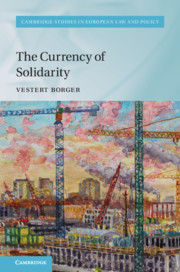Description
The Currency of Solidarity
Constitutional Transformation during the Euro Crisis
Cambridge Studies in European Law and Policy Series
Author: Borger Vestert
Analyses the European Union's constitutional transformation during the euro crisis, especially the interaction between politics and the ECJ in its materialization.
Language: English
Subject for The Currency of Solidarity:
Publication date: 10-2020
400 p. · 23.5x16 cm · Hardback
400 p. · 23.5x16 cm · Hardback
Description
/li>Contents
/li>Biography
/li>
In their fight against the debt crisis, the European Union and its member states took measures that have profoundly changed the euro. It now differs fundamentally from when it was introduced by the Treaty of Maastricht. Surprisingly, this change has come about with hardly any formal amendment to the Union's 'basic constitutional charter', the Treaties. How, then, to understand it? This book argues that the constitution of the EU has transformed, which occurs when constitutions change without amendment. The transformation is characterized by a broadening of the currency union's stability conception from price stability to also financial stability. Using solidarity as a lens, the book conceptualises the unity of the member states and analyses how this was preserved during the crisis. Subsequently, it explains how that changed the currency union's set-up and why the European Court of Justice could not turn against the change in Pringle and Gauweiler.
Prologue; Part I. Solidarity between the Member States: 1. The concept of solidarity; 2. Solidarity between the member states; Part II. The Original Stability Conception: 3. Committing to stability; 4. Law and economic wisdom; Part III. The New Stability Conception: 5. The shift in solidarity; 6. Contractual change and central bank action; 7. Reconciling the contract with the treaties; 8. Conclusion: Preserving the contract in an emergency; Bibliography; Index.
Vestert Borger is Assistant Professor of European Union Law at Leiden University and was previously Niels Stensen Fellow at Yale Law School between 2019 and 2020. He specialises in the law on the single currency and constitutional law and received the 2019 European Law Faculties Association Thesis Award for his dissertation on the transformation of the euro.
© 2024 LAVOISIER S.A.S.




